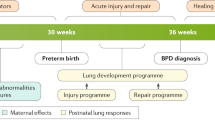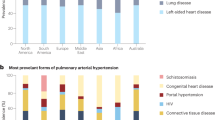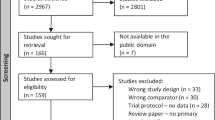Abstract
Nutritional support of extremely low-birth-weight infants has a critical role in the prevention, amelioration and recovery from bronchopulmonary dysplasia (BPD). Despite studies demonstrating the importance of providing adequate energy, protein and certain nutrients, no evidence-based nutritional guidelines exist. Attempts to improve outcomes with nutritional supplementation have been unsuccessful. These have included nutrients to enhance protection from oxidative lung injury (vitamin E, selenium, N-acetyl cysteine, superoxide dismutase), to improve surfactant function (inositol) and to improve pulmonary cell growth and differentiation (vitamin A). Only vitamin A has shown modest benefit. After infants with BPD move to the convalescent phase of their neonatal intensive care unit (NICU) stay, they continue to require extra energy and protein to grow at appropriate rates. Enriched formulas have shown promise, but standard supplementation schemes with commercial human milk fortifiers may be inadequate to meet the infant's needs. Efforts to individualize the amount of fortification guided by twice-weekly blood urea nitrogen determinations have led to improved gains in weight, length and head circumference.
This is a preview of subscription content, access via your institution
Access options
Subscribe to this journal
Receive 12 print issues and online access
$259.00 per year
only $21.58 per issue
Buy this article
- Purchase on Springer Link
- Instant access to full article PDF
Prices may be subject to local taxes which are calculated during checkout
Similar content being viewed by others
References
Clark RH, Thomas P, Peabody J . Extrauterine growth restriction remains a serious problem in prematurely born neonates. Pediatrics 2003; 111: 986–990.
Ehrenkranz RA, Dusick AM, Vohr BR, Wright LL, Wrage LA, Poole WK . Growth in the neonatal intensive care unit influences neurodevelopmental and growth outcomes of extremely low birth weight infants. Pediatrics 2006; 117: 1253–1261.
Van Aerde JEE, Narvey M . Acute respiratory failure In: Thureen PJ, Hay WW (eds). Neonatal Nutrition and Metabolism, 2nd edn. Cambridge University Press, New York, 2006, pp 508–521.
Yunis KA, Oh W . Effects of intravenous glucose loading on oxygen consumption, carbon dioxide production, and resting energy expenditure in infants with bronchopulmonary dysplasia. J Pediatr 1989; 115: 127–132.
Wilson DC, Cairns P, Halliday HL, Reid M, McClure G, Dodge JA . Randomized controlled trial of an aggressive nutritional regimen in sick very low birth weight infants. Arch Dis Child Fetal Neonatal Ed 1997; 77: 4–11.
Thureen PJ, Melara D, Fennessey PV, Hay Jr WW . Effect of low versus high intravenous amino acid intake on very low birth weight infants in the early neonatal period. Pediatr Res 2003; 53: 24–32.
Ibrahim HM, Jeroudi MA, Baier RJ, Dhanireddy R, Krouskop RW . Aggressive early total parenteral nutrition in low-birth-weight infants. J Perinatol 2004; 24: 482–486.
Te Braake FWJ, van den Akker CHP, Wattimena DJL, Huijmans JG, van Goudoever JB . Amino acid administration to premature infants directly after birth. J Pediatr 2005; 147: 457–461.
Poindexter BB, Langer JC, Dusick AM, Ehrenkranz RA, National Institute of Child Health and Human Development Neonatal Research Network. Early provision of parenteral amino acids in extremely low birth weight infants: relation to growth and neurodevelopmental outcome. J Pediatr 2006; 148: 300–305.
Tyson JE, Wright LL, Oh W, Kennedy KA, Mele L, Ehrenkranz RA . Vitamin A supplementation for extremely-low-birth-weight infants. National Institute of Child Health and Human Development Neonatal Research Network. N Engl J Med 1999; 340: 1962–1968.
Ambalavaran N, Tyson JE, Kennedy KA, Hansen NI, Vohr BR, Wright LL et al. Vitamin A supplementation for extremely low birth weight infants: outcome at 18 to 22 months. Pediatrics 2005; 115: e249–e254.
Ambalavaran N, Wu TJ, Tyson JE, Kennedy KA, Roane C, Carlo WA . A comparison of three vitamin A dosing regimens in extremely-low-birth-weight infants. J Pediatr 2003; 142: 656–661.
Watts JL, Milner R, Zipursky A, Paes B, Ling E, Gill G et al. Failure of supplementation with vitamin E to prevent bronchopulmonary dysplasia in infants less than 1,500 g birth weight. Eur Respir J 1991; 4: 188–190.
Darlow BA, Winterbourn CC, Inder TE, Graham PJ, Harding JE, Weston PJ et al. The effect of selenium supplementation on outcome in very low birth weight infants: a randomized controlled trial. The New Zealand Neonatal Study Group. J Pediatr 2000; 136: 473–480.
Davis JM, Parad RB, Michele T, Allred E, Price A, Rosenfeld W et al. Pulmonary outcome at 1 year corrected age in premature infants treated at birth with recombinant human CuZn superoxide dismutase. Pediatrics 2003; 111: 469–476.
Howlett A, Ohlsson A . Inositol for respiratory distress syndrome in preterm infants. The Cochrane Database of Systematic Reviews 2003, Art.No. CD000366. DOI: 10.1002/14651858.CD000366.
Brunton JA, Saigal S, Atkinson SA . Growth and body composition in infants with bronchopulmonary dysplasia up to 3 months corrected age: a randomized trial of a high-energy nutrient-enriched formula fed after hospital discharge. J Pediatr 1998; 133: 340–345.
Cooke R, Embleton N, Rigo J, Carrie A, Haschke F, Ziegler E . High protein pre-term infant formula: effect on nutrient balance, metabolic status and growth. Pediatr Res 2006; 59: 265–270.
Klein CJ (ed). Nutrient requirements for preterm infant formulas. J Nutr 2002; 132: 1395S–1577S.
Puangco MA, Schanler RJ . Clinical experience in enteral nutrition support for premature infants with bronchopulmonary dysplasia. J Perinatol 2000; 20: 87–91.
Arslanoglu S, Moro GE, Ziegler EE . Adjustable fortification of human milk fed to preterm infants: does it make a difference? J Perinatol 2006; 26: 614–621.
Gewolb IH, Vice FL . Abnormalities in the coordination of respiration and swallow in preterm infants with bronchopulmonary dysplasia. Dev Med Child Neurol 2006; 48: 595–599.
Barlow SM, Estep M . Central pattern generation and the motor infrastructure for suck, respiration, and speech. J Commun Disord 2006; 39: 366–380.
Barlow SM, Finan DS . A new therapeutic method for entraining the suck central pattern generator (CPG) in the premature infant. Presented at the 2006 PAS Annual Meeting, Abstract 413.
Acknowledgements
This is a summary of the presentation delivered at the third Annual Evidence versus Experience in Neonatal Practices Meeting held in June 2006, Boston, MA, USA.
Author information
Authors and Affiliations
Corresponding author
Rights and permissions
About this article
Cite this article
Young, T. Nutritional support and bronchopulmonary dysplasia. J Perinatol 27 (Suppl 1), S75–S78 (2007). https://doi.org/10.1038/sj.jp.7211725
Published:
Issue Date:
DOI: https://doi.org/10.1038/sj.jp.7211725
Keywords
This article is cited by
-
Definition and Outpatient Management of the Very Low-Birth-Weight Infant With Bronchopulmonary Dysplasia
Advances in Therapy (2012)



